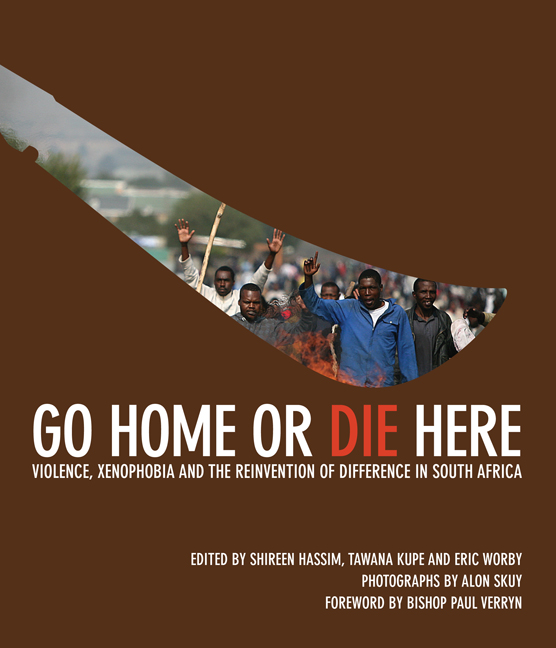Book contents
- Frontmatter
- Table of Contents
- Foreword
- Introduction
- A Torn Narrative of Violence
- I Did Not Expect Such a Thing to Happen
- (Dis)connections: Elite and Popular ‘Common Sense’ on the Matter of ‘Foreigners’
- Xenophobia in Alexandra
- Behind Xenophobia in South Africa – Poverty or Inequality?
- Relative Deprivation, Social Instability and Cultures of Entitlement
- Violence, Condemnation, and the Meaning of Living in South Africa
- Crossing Borders
- Policing Xenophobia – Xenophobic Policing: A Clash of Legitimacy
- Housing Delivery, the Urban Crisis and Xenophobia
- Two Newspapers, Two Nations? The Media and the Xenophobic Violence
- Beyond Citizenship: Human Rights and Democracy
- We Are Not All Like That: Race, Class and Nation after Apartheid
- Brutal Inheritances: Echoes, Negrophobia and Masculinist Violence
- Constructing the ‘Other’: Learning from the Ivorian Example
- End Notes
- Author Biographies
We Are Not All Like That: Race, Class and Nation after Apartheid
Published online by Cambridge University Press: 04 June 2019
- Frontmatter
- Table of Contents
- Foreword
- Introduction
- A Torn Narrative of Violence
- I Did Not Expect Such a Thing to Happen
- (Dis)connections: Elite and Popular ‘Common Sense’ on the Matter of ‘Foreigners’
- Xenophobia in Alexandra
- Behind Xenophobia in South Africa – Poverty or Inequality?
- Relative Deprivation, Social Instability and Cultures of Entitlement
- Violence, Condemnation, and the Meaning of Living in South Africa
- Crossing Borders
- Policing Xenophobia – Xenophobic Policing: A Clash of Legitimacy
- Housing Delivery, the Urban Crisis and Xenophobia
- Two Newspapers, Two Nations? The Media and the Xenophobic Violence
- Beyond Citizenship: Human Rights and Democracy
- We Are Not All Like That: Race, Class and Nation after Apartheid
- Brutal Inheritances: Echoes, Negrophobia and Masculinist Violence
- Constructing the ‘Other’: Learning from the Ivorian Example
- End Notes
- Author Biographies
Summary
The SMSs came fast and furious. As furious as the fiery images we were subjected to by our television and our daily newspapers. The front pages were a festival of beastly pictures of the victims of the negrophobic bloodletting which gripped South Africa in the past weeks. I dreaded opening a newspaper for days – afraid of being confronted by yet another grisly product of the negrophobic xenophobic violence, which by the end of week three had claimed the lives of over 60 people and displaced about 100 000, according to some estimates. The mind spins out of the axis of the normal.
As Alexandra township burnt, I read text messages from my cappuccino-loving Tito Mboweni-fearing middle class friends. The messages were generally along these lines: ‘I'm so embarrassed to be South African right now’ or more engaging: ‘I'm so tired of feeling angry about this and not being able to do something about it …’. Email lists held similar messages of shame. At least Winnie Madikizela-Mandela went to Alexandra and told the terrified victims cramped at the police station: ‘We are sorry, please forgive us. South Africans are not like this’ before hopping back into her nice car and driving back to her life. Desmond Tutu followed with another ‘Sorry, we are not like that’.
The leader of the narrow Zulu nationalist movement, Mangosuthu Buthelezi, went to the police station as well and cried for the cameras, at the same time as his followers from the hostel he had just addressed continued their war cry that they would kill all the ‘foreigners’, Hambani! Our president-in-waiting, Jacob Zuma, was told by an angry crowd: ‘Go back to Mozambique with your Mozambicans.’ Apparently his favourite solo ‘Umshini wam’ was sung by the marauding gangs as they went about their murderous deeds. The killings, burning and looting continued. Something had definitely broken, the despised were telling their leaders in their faces that they must all go to hell.
The next day, an SMS announced the clarion call: ‘Fight xenophobia! Donate food, clothes and money if possible.’
One of my friends had been working non-stop, even on weekends, to try do something to ease the hardships of the refugees now cramped in police stations and other camps.
- Type
- Chapter
- Information
- Go Home or Die HereViolence, Xenophobia and the Reinvention of Difference in South Africa, pp. 189 - 208Publisher: Wits University PressPrint publication year: 2008



